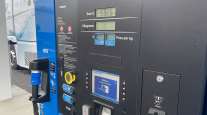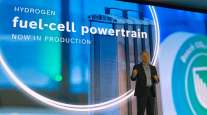Senior Reporter
Bosch to Spend $200 Million to Make Its First US Fuel Cell Stacks
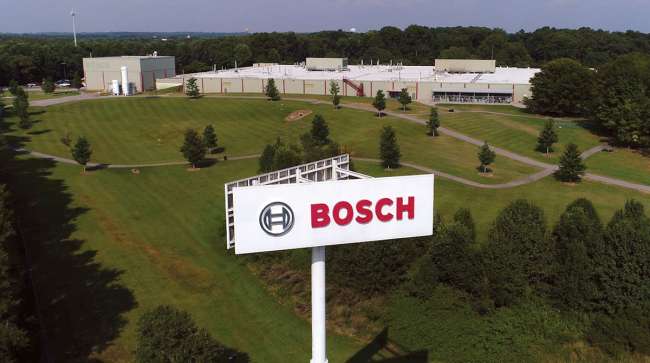
[Stay on top of transportation news: Get TTNews in your inbox.]
Bosch Group will invest $200 million to build fuel cell stacks in Anderson, S.C., its first such effort in the U.S.
Production is expected to start in 2026 and create 350 jobs, according to the German company, with a regional presence in North America since 1906.
“The hydrogen economy holds great promise, and at Bosch we are all in,” Mike Mansuetti, president of Bosch in North America, said in a release.
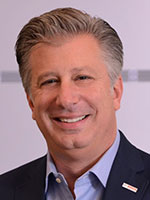
Mansuetti
A fuel cell operates by using hydrogen to generate electrical energy. As the hydrogen ions pass over the fuel cell plates, they combine with oxygen to create electricity. The only byproduct is water, allowing the vehicle to run with zero local carbon emissions.
When hydrogen is produced using renewable energy, also called green hydrogen, fuel cells enable vehicles to be operated nearly CO2-free. Especially for large, heavy vehicles, fuel cells have a better carbon footprint than exclusively battery-electric when the CO2 emissions for production, operation and disposal are added together, according to research by Bosch.
The Bosch Anderson facility already has begun work on the expansion to support fuel cell technology, the company reported. Capital upgrades to the Anderson campus include an estimated 147,000 square feet of floor space to be developed to manufacture the fuel cell stack as well as supporting clean room and climate-controlled environments required for quality-critical processes.
Bosch has a long presence in Anderson, where it started producing fuel rails in 1985, the company reported. Its operations have expanded to multiple products within the Bosch Mobility Solutions business sector, including sensors and electronic control units for the powertrain.
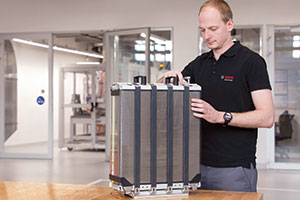
A Bosch employee with a fuel cell. (Bosch Group)
Fuel cell stack production is highly complex, Bosch noted. One stack consists of 3,200 individual parts assembled, more than 400 layers and more than 100 unique components. Fuel cell stack production in Anderson will expand on Bosch’s existing global production for fuel cell stacks, including critical subcomponents.
Mobile fuel cell technology presents a viable option for climate-neutral transportation of goods in Class 8 vehicles, in which battery-electric alone still presents challenges due to battery size and weight, Bosch noted. Fuel cells can make all-electric operation of large vehicles for long trips a reality.
How can hydrogen help trucks be more #sustainable? In our new #podcast episode, Bosch engineer Michael Marino explains how #fuelcell #technology helps companies like @nikolamotor to operate trucks with zero local CO² #emissions. https://t.co/dRvL9VZVKY — BoschGlobal (@BoschGlobal) August 25, 2022
The company recently announced it would invest more than $1 billion globally to develop mobile fuel cell technologies by 2024.
The development of the new production process in Anderson was supported locally with assistance from the state as well as Anderson County.
“Helping Bosch to be among the first to commercialize fuel cell stack production in the U.S. speaks to the strength of our manufacturing industry and workforce,” South Carolina Gov. Henry McMaster said. “We are grateful for Bosch’s commitment to our state and look forward to strengthening our partnership.”

Siamak Azmoudeh of SkyBitz discusses the rise of the smart trailer and why the industry standard is shifting toward more sensors, more data and more business intelligence. He joins host Seth Clevenger to explain the evolution of trailer telematics. Tune in above or by going to RoadSigns.ttnews.com.
For the period ending Dec. 31, 2021, Bosch generated consolidated sales of $13.6 billion in the U.S., Canada and Mexico.
The U.S. Department of Energy reported it has set ultimate targets for fuel cell system lifetime under realistic operating conditions at 8,000 hours for light-duty vehicles, 30,000 hours for heavy-duty trucks and 80,000 hours for distributed power systems.
In the most demanding applications, system reliability and robustness is required under dynamic and harsh operating conditions, according to DOE. Realistic operating conditions include starting and stopping, freezing and thawing, impurities in the fuel and air, and humidity and dynamic load cycles that result in stresses on the chemical and mechanical stability of the fuel cell system materials and components.
Want more news? Listen to today's daily briefing below or go here for more info:


